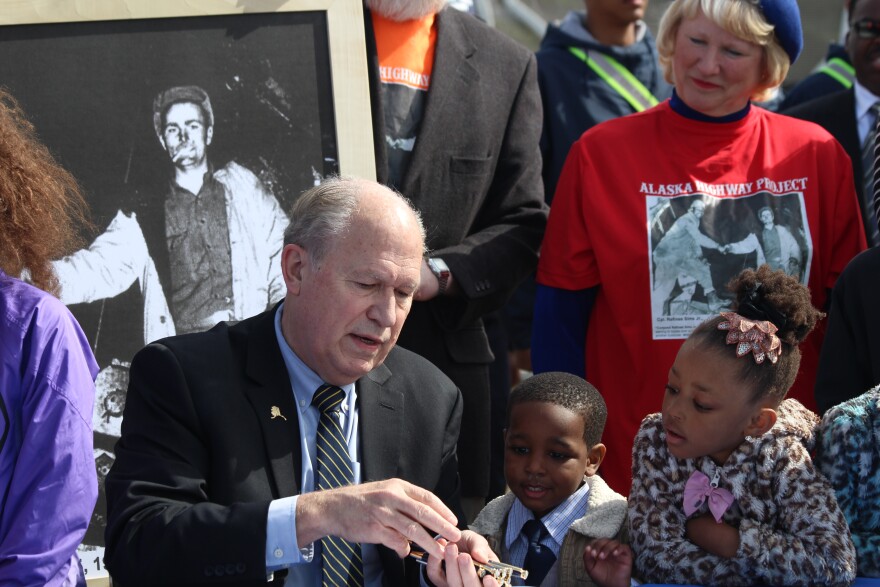Anchorage high school students will get a chance this year to learn about the work African-American soldiers did 75 years ago to help build the Alaska Highway. The retired educator who led the effort to get the district to teach that lesson says it’s important that Alaska students learn about this important part of their state’s history. KUAC’s Tim Ellis reports.
Jean Pollard is a retired schoolteacher who still proudly calls herself an educator. So when she learned some seven years ago that more than 3,000 African-American soldiers had helped build the Alaska Highway during World War II, she wondered why she didn’t learn about that little-known chapter in state history when she was a student attending Anchorage schools.
“Well, I’d never heard this before,” Pollard said. “And I graduated from high school and took Alaska studies, y’know.”
Pollard says she like most Alaskan students learned about the U.S. Army building the highway in 1942 to help defend the state from invasion by Japan. But until she saw a television documentary about the history of the highway, she didn’t know that more than a third of the 11,000-some soldiers who built it were black, serving in poorly equipped, segregated units. And neither did many of her fellow educators.
“And as I mentioned it to some social study teachers, nobody knew what I was talking about,” Pollard said.
So she contacted Lael Morgan, an Alaskan journalist and writer who was interviewed for the TV documentary. Pollard asked Morgan to help her research the subject and develop lessons to help Alaskan students learn about black soldiers’ crucial role in the highway project.
Pollard says she told Morgan that “I’m an educator. I’m feisty. We are born to educate, so we’ve got to get this story out.”
Morgan is a writer and former University of Alaska Fairbanks associate professor of journalism who’s written extensively about the subject. She says when she began researching it in the years leading up to the 50th anniversary of the Alaska Highway in 1992, she quickly learned there wasn’t much information available about it.

“They had literally been written out of history,” she said.
Morgan says more research has been done on the subject since the 50th anniversary. But she says after talking with Pollard in 2011, she realized public awareness of it had again faded.
“And Jean said, ‘Well, the only way to solve that problem is to get it into the school system.’ ”
So in 2012, she and a few others founded an organization they call the Alaska Highway Project, which Pollard now chairs. Their goals included collecting and sharing the black soldiers’ stories, building a memorial to their service and developing a curriculum that would give Alaskan students an opportunity to learn about the soldiers’ work on the highway.
“I missed the opportunity, and all the rest of us missed the opportunity,” Pollard said. “And I said, ‘Oh no, this generation … they need to know this.’ ”

In 2013, Pollard and Morgan talked with Pam Orme, the Anchorage School District’s social studies coordinator, about developing lessons on the subject that could be incorporated into history classes.
“We looked at the curriculum that’s required, and we saw that it fit absolutely perfectly in a unit focused on Jim Crow in Alaska,” Orme said in a February interview with Pollard and Morgan at the Anchorage district office.
So-called Jim Crow laws were instituted throughout the United States in the years after Civil War Reconstruction to maintain segregation and second-class citizen status for African-Americans. Morgan says the black soldiers helped end segregation in the military and American society through respect they earned by their hard work on the highway project.
“After the (Alaska Highway) building, our troops were sent all around to battlefields around the world,” Morgan said. “And they acquitted themselves very, very well.”

Gov. Bill Walker called the Alaska Highway “the road to civil rights” in comments he made April 30th, after signing legislationthat sets an annual observance of black soldiers’ work on the project. Pollard and Morgan testified in favor of the measure, and advocated for its passage.
Meanwhile, the Alaska Highway Project has recruited sculptors who’ve designed a memorial organizers hope to erect next year in Anchorage’s Centennial Park.
And last month, Pollard and Morgan joined Orme and a group of 30 other educators in an Anchorage School District workshop to develop a curriculum about the black soldiers’ service. Orme says Anchorage schools will begin using those lessons this fall. And she says they’ll share them with other districts statewide. Fairbanks North Star Borough School District officials say they’re interested.



